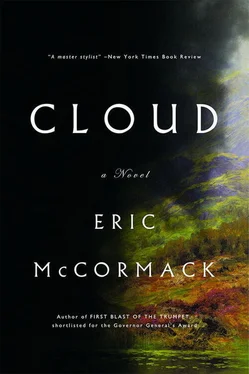“Well, that’s somebody I wouldn’t like to bump into on a dark night,” said my father.
I didn’t laugh and neither did my mother. I was curious about the people at the funeral who claimed that the way Ross died involved some kind of miracle. Maybe they were right?
My father spluttered, looking like a gargoyle with smoke belching out of its nose.
“Miracle?” he said. “If you ask me, the only miracle in this world is that so many people believe in miracles.” He liked that. “Am I not right, Nora?” he said, the way he often used to call for her approval when he thought he’d said something astute.
My mother didn’t answer him. She sat there, petting Penny and looking more worried than usual. So, my father left it at that and just puffed on the ever-shortening cigarette dangling from his lips till an inch of ash fell off. It slowly settled over his shirtfront, mingling with the evening’s already accumulated ash.
THAT NIGHT I LAY in bed staring up at the damp stains on the ceiling. Many nights I’d imagined they were tropical islands, like those I read about in adventure books. The sky was always blue there and the people were carefree and suntanned. Someday, when I was old enough, I intended to live in one of those idyllic places. I’d bring my parents with me and all three of us would stay in an airy bungalow overlooking the sky-blue ocean, far from these grim tenements.
But on that particular night the stains refused to be anything but Tollgate stains, pulsating in the dark like some kind of deadly fungus. In the end, I had to turn on my side, clench my eyes tight shut, and force myself to fall asleep.
At the age of eighteen, I became a student at the university— no fees were required of qualified applicants. It was in the west side of the city, a half-hour bus ride from the Tollgate. The massive, Gothic-looking structure, full of arched windows, dark stairwells, cold corridors, and drafty lecture halls, dominated the landscape.
I especially loved the library, with its spiral staircases and labyrinthine passageways between bookshelves. Some of the librarians were pale and otherworldly enough to be the ghosts of earlier librarians who’d lost their way amongst those passageways centuries ago.
In the middle of the library was a study hall completely hemmed in by ancient bookshelves full of the very oldest books. That study hall became my favourite place. It seemed almost to welcome visitors, breathing softly on them like some huge kindly animal. After morning lectures, I’d install myself at a table there and work happily all afternoon.
Then at six o’clock each night I’d squeeze onto a crowded bus for my journey home. Soon enough the elegant villas around the university, then the bustling, well-lit streets of the city centre, would be left behind and we would enter the canyons of grimy warehouses and tenements that constituted the Tollgate.
IN SOME OF THE STREETS we now passed along, murders and acts of violence were so commonplace they barely rated a mention in the newspapers. Even a glimpse through the bus window of the top floor of a certain tenement on Sheldon Street always made me shudder.
A thing had happened there before I went to university, but it had stuck in my memory, for my father had known the man involved. The man had lived in this tenement and was, by trade, a master carpenter. He’d built some cabinets and desks at the Random Mill offices where my father worked.
This master carpenter had been forced to retire from practising his trade because of chronic depression. Soon afterwards he’d brought some supplies of lumber into his apartment and spent most of his time in there, sawing and hammering. Some neighbours complained about the noise. He politely assured them that he’d been making some new furniture and was almost finished.
One day, the sawing and hammering ceased. After a week, a bad smell came from inside his apartment. The neighbours got no response when they knocked at the door.
The police were called, broke in, and discovered the true nature of the master carpenter’s work in his apartment. He’d been building an elaborate small-scale gallows in the living room, working from a complicated-looking set of blueprints.
The master carpenter himself was hanging from the gallows beam, quite dead. It seems he’d put the noose round his neck and used a broom handle to spring the latch of the trap door. His workmanship was precise: his toes dangled exactly three inches above the floor, ensuring that the fully extended rope would strangle him successfully.
A note was found on the floor beside him:
On this, my fiftieth birthday, I hereby find myself guilty on all counts and sentence myself to be hanged by the neck until I am dead. Sentence to be carried out immediately.
Exactly what he’d adjudged himself to be guilty of, no one was ever able to discover. My father, who’d spoken to the master carpenter only a few times and had found him a quiet, courteous man, was shocked at his death. But he couldn’t resist joking about it to my mother.
“If all the depressed people in the Tollgate start hanging themselves, there’ll soon be a national shortage of rope. Right, Nora?” he said.
She, as usual, looked anxious but didn’t answer.
A WIDELY REPORTED incident happened in another of the tenements during my first year at university.
The building in question was just a mile or so before my bus stop and was completely boarded up. Such a sight was not at all common. Despite the Tollgate’s reputation, its population kept growing and the demand for housing was always strong.
In one of the apartments in this particular tenement, a young woman, assisted only by her husband, had given birth to her first child in the traditional way — in a portable metal laundry tub on the floor of the back bedroom. But then, after the baby was born, the mother’s heart stopped and she died within minutes.
Once he understood what had happened, the husband proceeded to cut the baby’s throat. He then sat in a chair, drank a large glass of scotch, slit his own wrists, and bled to death.
At least, that was what the police and the neighbours concluded. The couple had been looking forward to the baby and the husband had seemed fond of his wife. All in all, his decision was understandable: he didn’t want to live without her and he didn’t want to leave an hours-old baby to the mercy of strangers.
But it wasn’t the tragic deaths of the three of them in that single apartment that emptied the entire tenement. No, the people of the Tollgate weren’t that sentimental. In fact, within a week of the deaths, after the apartment had been cleaned up, it was advertised for rent.
A young couple from a nearby tenement were first in line to look the apartment over. They’d checked the main living area and found it quite satisfactory. They were about to open the door of the back bedroom where the deaths occurred when they heard a strange noise. It sounded like a man’s voice coming from inside, sobbing and groaning. They quickly called some of the neighbours to come in, and when they did, they thought they heard the sound too. No one wanted to open the bedroom door.
In the following days, the apartment was examined by the city authorities and nothing was found or heard. But rumours spread and the exodus of the neighbouring tenants began. Within months the entire building was empty and boarded up. Whatever the people of the Tollgate may have lacked in sentimentality they made up for in superstition.
When this behaviour was duly reported in the newspapers, some of my fellow students laughed at it as the product of ignorance and illiteracy. I’d often heard them talking about the Tollgate, marvelling that civilized modern cities still contained such brutal slums. I, of course, didn’t advertise the fact that I lived there. I’d nod my head in agreement with their views. But I hadn’t forgotten my own reaction, as a boy, to the story of Cameron Ross, whose memorial wasn’t far from the haunted tenement. Even now, the thought of it gave me a chill.
Читать дальше











